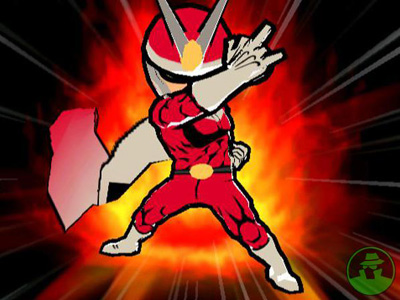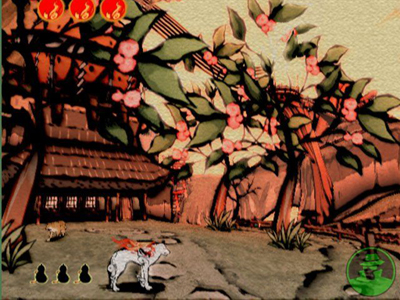Although the bulk of his presentation focused on production and management topics that would mainly interest video game developers, he did share a few interesting stories about the creation of the company's hit games.

Clover Studios had a hit with Viewtiful Joe.
Inaba pointed out three factors when developing an original game: the Gamble, the Risk, and the Thrill. The Gamble comes not only from imagining a new and creative idea for a game, but from getting to a point where that idea also becomes fun as a game. The Risk is continuing development while looking for the "hook" that makes your game unique, and the Thrill is overcoming obstacles like new hardware and ultimately turning your fantasy into a reality.
He illustrated these points by talking about Steel Battalion, Capcom's Xbox mech combat title best known for costing $200 and including a gigantic controller designed to emulate the controls of a "real" mech. This was certainly a Gamble, but as Inaba explained, Capcom was very supportive and patient. Although Battalion didn't generate tons of money, it did turn a profit and Inaba hopes that its success will inspire other game makers to take such chances.
Viewty and Creativity
Viewtiful Joe started as a basic beat-'em-up, moving into the Risk zone before the game designers found the "hook" -- the VFX Powers. Anyone who has played the game knows that these powers (such as slowing down or speeding up the action) make it a unique experience. It's also interesting to note the original Joe development team was originally six people working under a 12 month time limit. As progress was made on the game, the 12 months were entirely spent refining the concept of the game before actual development began. Ultimately, the project ended up taking 21 months with a significantly larger team. It was certainly a risky game to make, but the team's (and Capcom's) belief in the game helped create a new successful franchise.

Okami certainly isn't lacking in creativity.
Luckily, Inaba shared a few interesting tidbits about the Clover Studio's upcoming game, Okami, where you control a wolf. Although Capcom hasn't officially announced what systems Okami will be on, Inaba stated that it's being developed primarily for PS2. The game is already somewhat well known for its beautiful visual style, which is reminiscent of Japanese brush painting. We were shown a brief (less than 10 seconds) demo of the original version of Okami, which featured a realistic wolf running through a realistic environment. Inaba explained that the eventual decision to switch the game's visual style was the title's turning point.
Inaba ended his speech by calling for more original games to keep the industry energized. He stated that by continuing to develop sequels and rehashes, the market will shrink as consumers grow tired of the same old thing. The point was also made that sex and violence alone can not keep the game market afloat forever. If more studios follow the lead of Clover, we're bound to see many wonderful games in the years ahead.


